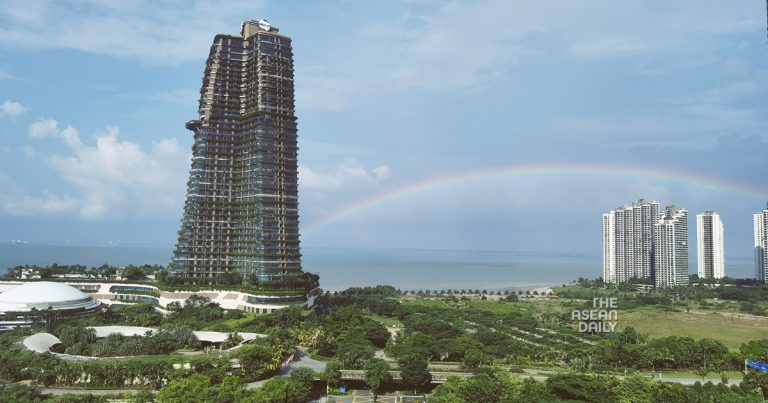29-8-2023 (KUALA LUMPUR) On Monday, Country Garden, China’s largest property developer, affirmed that its five projects in Malaysia continue to operate smoothly with robust sales performance, alleviating concerns about the company’s potential debt crisis.
Among its Malaysian ventures is the colossal Forest City in Johor, a project valued at a staggering US$100 billion (S$136 billion). Notably, this project received a significant boost recently when Prime Minister Anwar Ibrahim declared it a “special financial zone” to stimulate economic growth in southern Johor.
In a statement, the developer’s Malaysia and Singapore unit reassured stakeholders: “To date, the overall operation of the region is safe and stable. Our company’s projects in Malaysia are operating normally, and the sales performance is strong.”
The statement further outlined the company’s commitment to explore various debt management measures to proactively address liquidity pressures and secure its long-term development.
Country Garden Holdings, however, confronts significant financial obligations, with total liabilities reaching US$194 billion at the close of 2022. Concerns have been mounting, particularly regarding the future prospects of Forest City and the company’s other Malaysian projects.
In August, Country Garden missed two coupon payments, totaling US$22.5 million, sparking further unease in the financial markets.
Within Johor, Country Garden’s projects encompass Forest City, Country Garden Danga Bay, Central Park, Lake City@KL North, and Diamond City in the Klang Valley.

Prime Minister Anwar’s announcement of incentives for the Forest City special zone has garnered attention, including multiple entry visas, expedited entry for Singaporean workers, and a flat income tax rate of 15 percent for knowledge workers. Anwar expressed confidence that these measures would attract companies grappling with high operational costs in Singapore, which extends to housing and education expenses.
Forest City stands as Country Garden’s largest international undertaking, with a vision to accommodate 700,000 residents across four reclaimed islands by 2035. The development encompasses upscale condominiums, landed homes, shopping malls, office towers, and industrial parks.
Country Garden holds a 60 percent stake in the master developer of Forest City, Country Garden Pacificview, while the remaining 40 percent is owned by Esplanade Danga 88, a private Malaysian firm jointly owned by a Johor government agency and the state’s Sultan Ibrahim Iskandar.
The original plan for Forest City envisaged four islands totaling 2,000 hectares, nearly three times the size of Ang Mo Kio. Presently, 1,400 hectares have been reclaimed, with around 15 percent of the project already developed on one of the artificial islands.
While some 30 condominium blocks have been completed, a recent visit by The Straits Times revealed that many of them appeared to have a low occupancy rate. This might be attributed to the fact that out of the 26,000 units delivered to buyers, approximately 70 percent were purchased by Chinese nationals.
Nonetheless, some residents remain optimistic about Forest City’s prospects. Ms. Joyce Shi, a Chinese business owner and Forest City resident, expressed her satisfaction with the development, downplaying concerns about Country Garden’s financial troubles. She commented, “I am not worried. It is big news in China, but it doesn’t affect me.”
Other residents echoed this sentiment, emphasizing the quality of life and amenities Forest City offers.
Property experts in Johor acknowledge the concerns arising from Country Garden’s debt crisis but suggest that the impact on completed developments should be minimal. Some units have already been rented out, including to Malaysians working in Singapore and Singaporeans. Availability for staycations has also contributed to occupancy.
Country Garden reported an increase in residents moving into Forest City as global borders gradually reopened after the COVID-19 pandemic. According to the company, over 9,000 owners and long-term tenants are currently residing in Forest City.
Despite the initial concerns about Forest City’s occupancy, recent developments and testimonials from residents indicate that it may not be the “ghost town” it was once portrayed as. As the pandemic-related restrictions eased and travel between Malaysia and China resumed, the residential community in Forest City has grown steadily.

Dr. Gregg Maloberti, head of Shattuck-St Mary’s Forest City International School, located within Forest City but operating independently, affirmed this observation, noting that the community has not been a ghost town, as some reports have suggested. The school is currently accommodating nearly 200 students out of a potential 900.
While 33 percent of students hail from China, 30 percent come from South Korea, and 5 percent represent Japan and the United States, with students from other nationalities constituting the rest of the student body.




